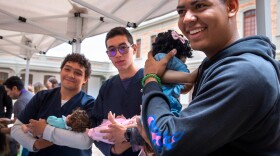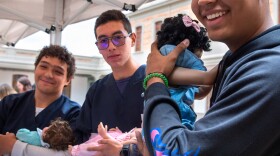
Ben de la Cruz
Ben de la Cruz is an award-winning documentary video producer and multimedia journalist. He is currently a senior visuals editor. In addition to overseeing the multimedia coverage of NPR's global health and development, his responsibilities include working on news products for emerging platforms including Amazon's and Google's smart screens. He is also part of a team developing a new way of thinking about how NPR can collaborate and engage with our audience as well as photographers, filmmakers, illustrators, animators, and graphic designers to build new visual storytelling avenues on NPR's website, social media platforms, and through live events.
De la Cruz joined NPR as the multimedia editor for the Science Desk in June 2012. In this role, he served as the visual architect for NPR's coverage of health, science, environment, energy, food, and agriculture.
De la Cruz began his career as a multimedia journalist at washingtonpost.com in January 2000. During his 12-year career there, he helped create the newspaper industry's groundbreaking multimedia site, Camera Works. Along the way, he managed the dozen-person multimedia and documentary video departments, overseeing feature and news reporting.
While at washingtonpost.com, de la Cruz's series of 12 profiles about racial identity for the Being a Black Man project won the prestigious George Foster Peabody Award. The award marked the first time a newspaper won what is widely considered to be the Pulitzer Prize of broadcast journalism. In 2014, de la Cruz was part of the NPR team that won a Peabody Award and a World Press Award for its coverage of the Ebola outbreak in West Africa.
His reporting on the multimedia project Under Suspicion: Voices About Muslims In America has been recognized with a National Edward R. Murrow Award. He has also received three Emmy Award nominations for his work on Top Secret America (2010), Living with PTSD (2007), and Being A Black Man (2006).
Prior to joining The Washington Post, de la Cruz worked as an independent producer for public television, a print reporter covering the Internet industry, and a freelance photography reviewer for Photo District News magazine. He has also co-produced and written songs released by Sony Music, Dischord, and DCide Records.
De la Cruz is also a sought-after speaker and has won numerous awards for his documentary video editing and cinematography from The National Press Photographers' Association, The White House News Photographers' Association, Pictures of the Year International, and the Webbys, to name a few.
Some of his favorite NPR projects include "They Are The Body Collectors: A Perilous Job In The Time Of Ebola," "The Milkshake Experiment," "Hot Pot: A Dish, A Memory," "Exploring The Invisible Universe That Lives On Us — And In Us," "Dropping Science," "The Refugees Who Don't Want To Go Home ... Yet," and "Life After Death."
Born in Manila, de la Cruz grew up in Baltimore and now lives with his son and wife in Washington, DC.
-
These stunning photos include a polar bear in a Chinese zoo, a teen in Zambia facing an uncertain future, Mongolian kids watching TV in a tent, a chef prepping a bowl of good-for-you soup.
-
Our most-viewed Instagram videos include reports from a Rhode Island factory that makes special food for malnourished children and from a tournament for soccer-playing "grannies."
-
Crowds filled a stadium in Arizona to remember the right-wing activist Charlie Kirk.
-
March 20 is International Happiness Day — a day that the United Nations had dedicated to the celebration of joy. We asked photographers around the world to share a picture that can bring bliss.
-
At least 153,000 Los Angelenos have had to evacuate their homes and about 166,000 people were under evacuation warnings as of Saturday, according to the LA County Sheriff's Department.
-
The most popular Instagram reels from our Goats and Soda team: Bolivia's bold women skateboarders, ponytail-making lessons, a perplexing COVID situation, fog harvesting.
-
People love looking at photos. (Just ask Instagram.) This year, we published a number of photo-driven posts that resonated deeply with our audience. Here are some of our favorites.
-
From salamanders and salmon to bears and mountain lions, David Herasimtschuk's images illustrate not only the beauty of the forests and their creatures but the symbiotic relationships that are vital to the forests’ health and the planet’s welfare.
-
Un programa innovador en Colombia brinda a los hombres la oportunidad de dominar las habilidades necesarias para ser padres activos y, al mismo tiempo, acercarse más a sus hijos.
-
An innovative program in Colombia gives men a chance to master the skills needed to be a hands-on dad — and become closer to their kids along the way.










